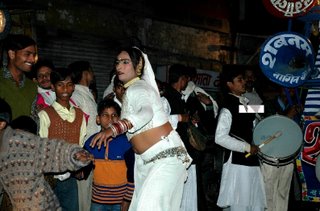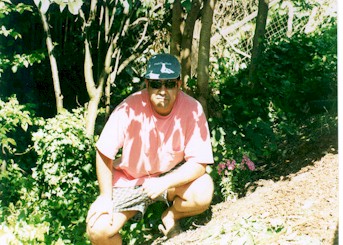Shaming

Reuters reports this week on the shaming of shopkeepers into paying taxes:
"Dancing and singing eunuchs are knocking on doors in the Indian city of Patna in a bid to embarrass shopkeepers into paying their taxes. The new shock strategy, in which sari-clad and heavily made up eunuchs accompany officials on their rounds of crowded shopping areas in a country notorious for tax evasion and non-payment, has been declared a success.
"Some paid in cash, while others quickly wrote checks. The shock therapy, which we plan to use sparingly, was a grand success," Atul Prasad, a top official in impoverished Bihar state, of which Patna is the capital, told Reuters Friday.
The novel tax-collection technique kicked off Wednesday, with boisterous eunuchs loudly demanding that mortified shopkeepers pay up -- to the bemusement of scores of onlookers.
Taxmen pocketed 425,000 rupees ($9,570) from defaulters in a few hours.
"People may be afraid of them, but they are very much part of society and are useful," Prasad said, adding that authorities would pay the eunuchs a four percent commission on the total tax collected.
Eunuchs are still common in India, where they live in closed-knit communities. Some are castrated men but others are transsexuals and hermaphrodites who have been ostracized by their families. Also known as hijras, they are widely feared and move around towns and cities in groups and demand money on occasions such as marriage or the birth of a child.
No account of India travels can escape that stock chapter -- hijras. Here's William Dalrymple in the City of Djinns:
Men who become hijras may happen to previously be - in Western terminology - hermaphrodites, transsexuals, transvestites, gay, or plain ol' straight but it looks like many of them share a state of acknowledged 'immediate' impotence that after becoming hijras might turn them into real masters over the forces of procreation. They often perform as dancers on weddings and after a son is born to family; they also work as prostitutes to men, though, and they really are both marginalized and feared/respected at the same time.
'Hijras' -- the term is related to the Arab hegira (cutting of ties, withdrawal) -- are not unique to India. Here's an extended quote on Berdaches:
Alternative gender roles were among the most widely shared features of North American societies. Male berdaches have been documented in over 155 tribes. In about a third of these groups, a formal status also existed for females who undertook a man’s lifestyle, becoming hunters, warriors, and chiefs. They were sometimes referred to with the same term for male berdaches and sometimes with a distinct term—making them, therefore, a fourth gender. (Thus, 'third gender' generally refers to male berdaches and sometimes male and female berdaches, while 'fourth gender' always refers to female berdaches.) Each tribe, of course, had its own terms for these roles, such as boté in Crow, nádleehí in Navajo, winkte in Lakota, and alyha: and hwame: in Mohave. Because so many North American cultures were disrupted (or had disappeared) before they were studied by anthropologists, it is not possible to state the absolute frequency of these roles. Those alternative gender roles that have been documented, however, occur in every region of the continent, in every kind of society, and among speakers of every major language group. The number of tribes in which the existence of such roles have been denied (by informants or outsider observers) are quite few. Far greater are those instances in which information regarding the presence of gender diversity has simply not been recorded.
'Berdache' has become the accepted anthropological term for these roles despite a rather unlikely etymology. It can be traced back to the Indo-European root *wela- 'to strike, wound,' from which the Old Iranian *varta-, 'seized, prisoner,' is derived. In Persia, it referred to a young captive or slave (male or female). The word entered western European languages perhaps from Muslim Spain or as a result of contact with Muslims. By the Renaissance it was current in Italian as bardascia and bardasso, in Spanish as bardaje (or bardaxe), in French as berdache, and in English as 'bardash' with the meaning of 'catamite' — the younger partner in an age-differentiated homosexual relationship. Over time its meaning began to shift, losing its reference to age and active/passive roles and becoming a general term for male homosexual. In some places, it lost its sexual connotations altogether. By the mid-nineteenth century, its use in Europe lapsed.
The use of Hijras to shame is hardly new. Remember Taiyyab Ali, pyar-ka-dushman?
Taiyyab Ali pyar-ka-dushman, hai hai
Ladka aur ladki -- raazi
Phir bhi na mane -- kaazi
Ye zid na chhore, meri dil ko tore
Ye banne na de meri Salma ko meri dulhan ...
Taiyyab Ali pyar-ka-dushman, hai hai.
Taiyyab Ali, enemy-of-love, fie fie
The boy and the girl -- they're willing
But the judge -- he's been stalling
He stays stubborn, he breaks my heart
He won't let my Salma be my lovely bride ...
Taiyyab Ali, enemy-of-love, fie fie.
If the video does not load, try here.

2 Comments:
"It can be traced back to the Indo-European root *wela- 'to strike, wound,' from which the Old Iranian *varta-, 'seized, prisoner,' is derived."
You mean *welh2-. I gather you're using Julius Pokorny's reconstruction which is at least 50 years out of date now. Today, the sounds *h1, *h2 and *h3 are used in some places where it was once reconstructed only as *e, *a and *o respectively.
Most (though not all) Amerindian tribes considered berdaches to be two-spirited -- e.g. a male to whom a female spirit has been added; whereas hijras by definition are males from whom something has been removed, or alienated. This important difference informs the different ritual locations berdaches and hijras have in society; the berdaches for medicinal and healing purposes, the hijras for shaming as the video nicely illustrates.
See the book Spirit and the Flesh: Sexual Diversity in American Indian Culture -- http://www.amazon.com/exec/obidos/ASIN/0807046159/whosoevanonlinemA/
Post a Comment
<< Home